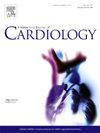Real-world comparative effectiveness of angiotensin-neprilysin inhibition versus angiotensin receptor blockers in acute myocardial infarction
IF 3.2
2区 医学
Q2 CARDIAC & CARDIOVASCULAR SYSTEMS
引用次数: 0
Abstract
Background
Angiotensin-neprilysin inhibition (ARNI) reduces mortality and morbidity in chronic heart failure, but its efficacy in acute myocardial infarction (MI) remains uncertain. This study compares ARNI versus angiotensin receptor blockers (ARB) in acute MI patients.
Methods and results
This cohort study used a target trial emulation approach to include acute MI patients between 2019 and 2022 from the Tianjin Health and Medical Data Platform, China. Eligible patients newly prescribed ARB or ARNI during hospitalization were matched 1:1 using propensity scores. The primary outcome was all-cause mortality at 30 days and 1 year. Time-dependent hazard ratio (HR) was used to the explore potential benefit window of ARNI. The matched cohort included 10,480 patients (5240 per group) for intention-to-treat analysis, with 701 deaths (6.7 %) recorded. Compared with ARB, ARNI was significantly associated with a lower 30-day mortality risk (HR: 0.68, 95 % confidence interval [CI]: 0.52–0.88) but showed no association with 1-year mortality (HR: 0.99, 95 % CI: 0.85–1.14). Exploratory analysis indicates that the beneficial effect of ARNI extends to 60 days (HR: 0.68, 95 % CI: 0.52–0.88). No significant differences were observed for recurrent MI (HR: 0.98, 95 % CI: 0.87–1.10) or stroke (HR: 1.15, 95 % CI: 0.98–1.35). Subgroup analysis indicated a particular benefit of ARNI in heart failure patients at 60 days (HR: 0.75, 95 % CI: 0.58–0.96).
Conclusions
In patients with acute MI, ARNI was associated with improved survival compared to ARB within the first 60 days. This survival benefit diminished over time, with no significant difference observed at 1-year follow-up.
血管紧张素-奈普利素抑制与血管紧张素受体阻滞剂在急性心肌梗死中的实际效果比较。
背景:血管紧张素-neprilysin抑制剂(ARNI)可降低慢性心力衰竭的死亡率和发病率,但其对急性心肌梗死(MI)的疗效仍不确定。本研究比较了急性心肌梗死患者ARNI与血管紧张素受体阻滞剂(ARB)的疗效。方法和结果:本队列研究采用目标试验模拟方法,纳入了来自中国天津卫生和医疗数据平台的2019年至2022年的急性心肌梗死患者。住院期间新开ARB或ARNI的符合条件的患者使用倾向评分进行1:1匹配。主要终点是30 天和1 年的全因死亡率。时间相关风险比(HR)用于探索ARNI的潜在获益窗口。配对队列包括10,480例患者(每组5240例)进行意向治疗分析,记录了701例死亡(6.7 %)。与ARB相比,ARNI与较低的30天死亡风险显著相关(HR: 0.68, 95 %可信区间[CI]: 0.52-0.88),但与1年死亡率无相关性(HR: 0.99, 95 % CI: 0.85-1.14)。探索性分析表明,ARNI的有益效果可延长至60 天(HR: 0.68, 95 % CI: 0.52-0.88)。复发性心肌梗死(HR: 0.98, 95 % CI: 0.87-1.10)或卒中(HR: 1.15, 95 % CI: 0.98-1.35)无显著差异。亚组分析表明,ARNI在60 天心力衰竭患者中有特别的益处(HR: 0.75, 95 % CI: 0.58-0.96)。结论:在急性心肌梗死患者中,与ARB相比,ARNI在前60 天内与生存率提高相关。这种生存获益随着时间的推移而减少,在1年的随访中没有观察到显著差异。
本文章由计算机程序翻译,如有差异,请以英文原文为准。
求助全文
约1分钟内获得全文
求助全文
来源期刊

International journal of cardiology
医学-心血管系统
CiteScore
6.80
自引率
5.70%
发文量
758
审稿时长
44 days
期刊介绍:
The International Journal of Cardiology is devoted to cardiology in the broadest sense. Both basic research and clinical papers can be submitted. The journal serves the interest of both practicing clinicians and researchers.
In addition to original papers, we are launching a range of new manuscript types, including Consensus and Position Papers, Systematic Reviews, Meta-analyses, and Short communications. Case reports are no longer acceptable. Controversial techniques, issues on health policy and social medicine are discussed and serve as useful tools for encouraging debate.
 求助内容:
求助内容: 应助结果提醒方式:
应助结果提醒方式:


